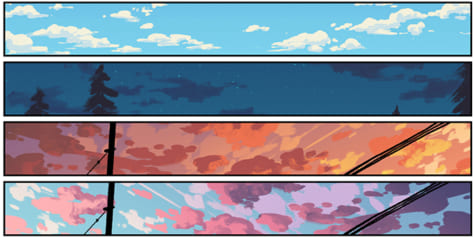



Drawing freely from imagination is cool, but not everything can be drawn using free, intuitive movement of the hand. Man-made objects, like vehicles and buildings, are created according to certain rules, and these rules bind our freedom. You can’t draw a building by guessing the lines—you must follow the rules, and these rules are defined by perspective.
In this tutorial I will how you how to draw a house step by step in the two-point perspective. I’ll do my best to explain the whole process to you rather than just tell you what to do.
What You Will Need
You can use any photo of a house you want, for example your own. We will not copy the reference, but we need some kind of a base to know what we’re trying to draw. So its perspective doesn’t need to be perfect—we’ll create our own view!
You can draw using any tool, but it’s best to use some drawing software for this—perspective doesn’t require fine manual skills, so you can successfully use a mouse for this. If you prefer to draw traditionally, make sure you use a much bigger sheet of paper than the intended size of the drawing. And don’t forget to use a long ruler!
1. How to Start a Drawing in Perspective
Step 1
Start with the horizon line. When something’s above it, you look up on it. When something’s below it, you look down on it.



Step 2
We want two sides of the building visible: the right side and the front. They share a common dimension: their height. In 2-point perspective, height is generally the dimension that stays perfectly vertical, so we don’t need to draw any vanishing points for it.



However, it’s also important where we place that height. The center of the horizon line is also the center of the vision. If you place that edge line there, both sides will be equally visible. If you place it more to the left, the front will be more visible at the cost of the side. And that’s what we want!






Step 3
Perspective turns parallel lines into convergent lines. Where do they converge? Well, it depends on you. The more of the side you want to see, the farther the vanishing point should be.



Step 4
Draw the other edge of the front between both lines. Imagine how long the front would be without perspective, and then make it shorter according to the angle between the left edge and the ground—90 degrees would give the full length, and the smaller the angle, the shorter it must be.









Step 5
You can now connect both edges to create a full surface of the front wall. Keep in mind these two lines are parallel in reality! Everything parallel to them will go towards that vanishing point.









Step 6
Time for the other side. The rule is very simple here: the more visible one side, the less visible the other. So we need to place the vanishing point close.



Step 7
Again, imagine the full length of that side and shorten it according to the angle.









Step 8
Close the shape of the side with two more lines. Again, these lines are parallel and everything parallel to them will go towards the same direction.









Step 9
Now that you know how to use the vanishing points, I will show the drawing up close to make the details more visible.
Perspective distorts proportions, so we need to place the guide lines very carefully. It’s best to use special, universal algorithms to divide an area into equal parts. Let’s divide the front in half and in thirds—the porch seems to be about one-third of the length, so this would be useful for us.



First connect the corners of the front.






Step 10
The diagonals of a rectangle show you the center of it even in perspective. So this is how we divide it into halves. Keep this middle line fully vertical.






Step 11
Once we have the middle lines, we can use it to create thirds:












Keep these guide lines only that visible to use them later, but without confusing them with the final lines of the drawing.



Step 12
The other side seems to be about five windows long, so it will be the most useful to us to divide it into fifths. There’s an algorithm for this as well:

































Again, keep these guide lines barely visible.



2. How to Add Windows and Doors in Perspective
Step 1
We need more guide lines to place the elements on the wall properly. Because this is a building, we can expect the elements follow some kind of proportion. Once we discover it, we can use it in our drawing.
Look at the height of the outline above the windows, the windows, and the lower part of the wall. Mark them on the edge.









Step 2
Draw parallel lines through these points. Do you remember what parallel means here?






Step 3
It’s the easiest to divide the areas in halves and thirds, so let’s assume the window, with all its outline, is one-ninth of the length of the front. Divide each third into thirds to create guide lines for this.






Step 4
The door does not have such obvious proportions, so we need to create it ourselves. Connect two clear points…






… and draw a vertical line through a crossing of the guide lines.






Step 5
We now have enough guide lines to outline the windows and door.









Step 6
The actual windows start slightly deeper within the outline. How can we guess their width? Well, let’s create it! Symmetrical ‘X’s are easy to draw…






… and they neatly cross that upper guide line.









3. How to Draw a Roof in Perspective
Step 1
The roof of the house in my reference is not a simple one, but don’t let that discourage you! Every roof follows the same rules, and some just need more work to apply them.
Define the highest point of the roof. You must think in 3D—you can’t just elongate one wall vertically and place that point there. That point must belong to both walls at the same time!









Step 2
My roof has a “ridge” on top. Its width will be a nice reference point, but we need to define it first. Again, to add any length to our drawing in perspective, we must base it on something that’s already been drawn. For example, draw two diagonals through the thirds on the side of the window (we can be sure they’re symmetrical)…









… and draw a line through the point where they cross with the lowest horizontal guide line.






Step 3
To draw the height of these lines, we need to place them on the same level as the middle line. Project some lines through guide lines to find the right spot.



Step 4
We know where this ridge starts, but we still don’t know where it ends. More guide lines are necessary to find that point. Remember to keep the proportions from the base view!









Step 5
You can now easily outline the ridge.






Step 6
Before we draw the rest of the roof, we need to understand exactly what we want to draw. From the side, the roof looks like a triangle, and we already have the top of this triangle, so we need to follow that rhythm.



If we elongate the top of the wall towards that line, we’ll find the length of the roof (measuring the distance from the wall to the edge).



Now our job is to create some easily replicable guide lines. It doesn’t matter where they are, as long as they create the proportion we want every time they’re used.



Apply these guide lines to the drawing in perspective.



Step 7
To find the actual length of the roof, we need to project it to the ground.



Step 8
We have the length, but we also need the exact placement of the corners. They’re easy to find now!



Step 9
These points are useless to us as long as they’re on the ground, but it’s not difficult to project them to their right level.






Step 10
Finally, connect the dots!






4. How to Draw a Complicated Roof in Perspective
Our house has its walls and the roof, so it’s technically done. But it’s boring, and it doesn’t look like the reference at all! Now we’re going to make it look more interesting, but keep in mind this may create a higher level of difficulty. I will also assume you’ve grasped the techniques we’ve been using so far, so I may not explain every step as thoroughly.
Step 1
The elements on the roof are placed in a non-random way, and we need to discover it. Let’s create some repeatable guide lines in advance: divide the side of the middle block into eight parts.






Step 2
The roof of the porch starts in the horizontal center, but not exactly in the center of the roof. Find the exact points you want to use for guide lines, and then project them to your drawing.









Step 3
The roof of the porch seems to be parallel to the rest of the roof. We can mark it easily on the side view, but how can we find it in perspective?






As always, we need to create replicable guide lines that point to our desired result…



… and project them to the drawing.



Step 4
We know how long the roof is on the side, but we also need to find its width (which, like the reference suggests, is slightly longer than the middle third of the front wall). These guide lines should do the job.









Step 5
Now we need to cross the guide lines from both dimensions to find the corners of the roof. The illustration below may look confusing, because we’re so close to the horizon line that the guide lines are almost horizontal.



Step 6
Now we have all we need to outline the little roof!






Step 7
The protruding windows on the roof will be quite complicated to draw, so feel free to skip them if you feel lost.
First, let’s add some guide lines on the roof to see its surface better. We don’t have vanishing points for them, so just follow their rhythm.






Step 8
We need more guide lines in that inner block of the roof. Divide it into quarters.






Step 9
We should know enough to place the base of the window.






Step 10
The window has a triangular top, so we need to mark it as well. Quite easy once we stay on the same level of depth, isn’t it?






Step 11
Now we need to project the window outline to its place on the roof. I told you it was going to be difficult!


















Step 12
The roof of that window is protruding, so we need to project it forward as well. We’re going to use the front wall as a reference to make it easier.









Make the whole window outline protrude in order to make measurements easier.



Step 13
The roof has a certain thickness and angle, so they’re not easy to project. Use a trick to create them: find guide lines on the window outline that automatically create the outline of that roof. It doesn’t need to be perfect, just close enough.












Step 14
Create the other window using the same steps, or by drawing guide lines through the already drawn one.



Step 15
We know exactly where the roofs starts, so we can easily draw their tops.



Step 16
The sides of these windows go towards the inside of the roof, but they’re also covered by it. The curvature of the roof can be measured, but we don’t need to be as precise—just remember that every line going down must be shifted slightly towards the front (as its back gets gradually concealed by the roof).






5. How to Draw a Porch With Steps in Perspective
Step 1
The porch has symmetrical sides, but we only have a guide line on one of them. Let’s create a similar one on the left side.






Step 2
Use these guide lines to create the outline of the short wall.









Step 3
These walls will be as long as the roof over them, but not as wide. Use an additional guide line to exclude the part of the roof from the width of the porch area.






Step 4
You can now give these walls all their sides.






Step 5
Divide the inner side of the wall into thirds—this should be enough to create four steps.






Step 6
The first step is quite flat, so mark it first before adding the other steps. Its height may be arbitrary.









Step 7
Divide the two thirds into 16 parts—four heights and four lengths of every step.






Step 8
Draw the outline of the steps, following the guide lines.









Step 9
Now you have enough guide lines to draw the steps.









Step 10
The porch wall has an elevated part, so we need to draw it as well. It should be easy to measure it with what we already have.












Step 11
There are pillars supporting the roof growing from the lower part of the wall. I’m going to go the easy way and make them as wide as the wall and a step.









Step 12
When all the guide lines are done, you can finish your drawing. If you’re creating it digitally, you just need to remove the guide lines and add the details following the rhythm of the other elements. If you’re drawing traditionally, it’s better to place a new sheet of paper on the sketch and draw clean lines on the top.



Good Job!
It was a long tutorial, but I hope I managed to clear some things up about perspective and drawing buildings from scratch. Don’t forget to post your result in the comments!









